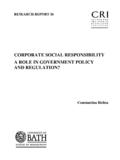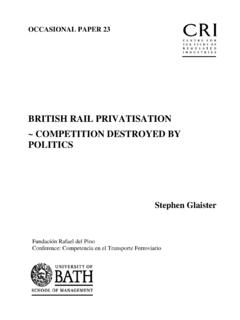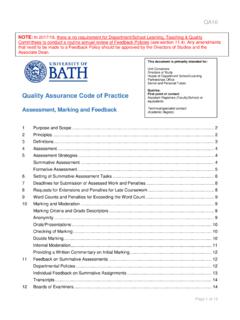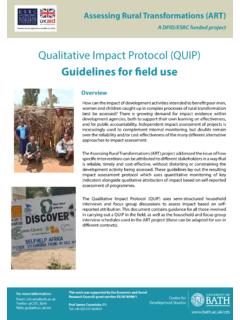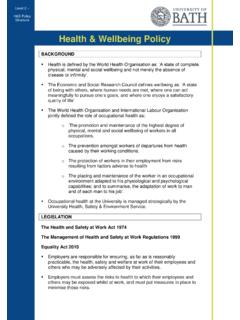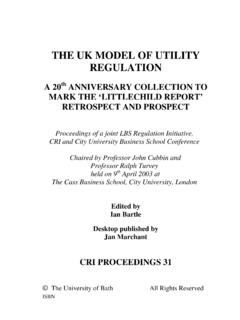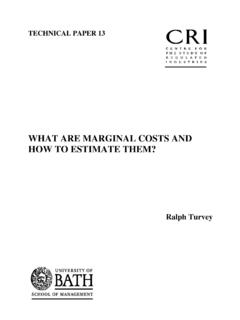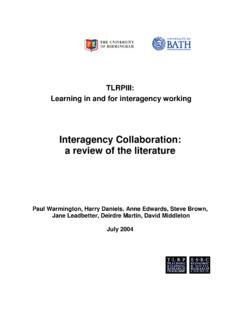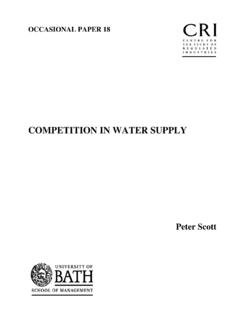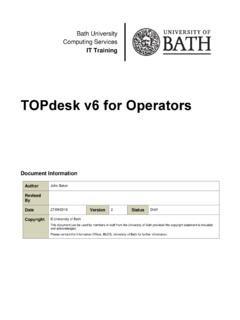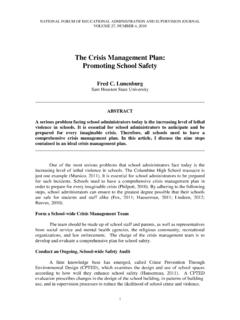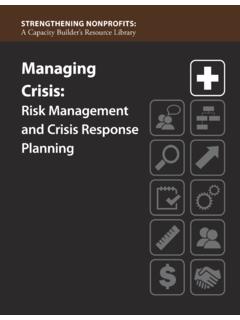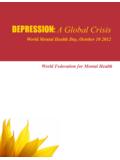Transcription of BRITAIN’S RAILWAY CRISIS - University of Bath
1 OCCASIONAL PAPER 20. britain 'S RAILWAY CRISIS . ~ A REVIEW OF THE ARGUMENTS. IN COMPARATIVE PERSPECTIVE. Ian Bartle The University of Bath School of management is one of the oldest established management schools in britain . It enjoys an international reputation for the quality of its teaching and research. Its mission is to offer a balanced portfolio of undergraduate, postgraduate and post-experience programmes, research and external activities, which provide a quality of intellectual life for those involved in keeping with the best traditions of British universities. britain 'S RAILWAY CRISIS . A REVIEW OF THE ARGUMENTS IN.
2 COMPARATIVE PERSPECTIVE. Occasional Paper 20. Ian Bartle Desktop published by Jan Marchant The University of Bath All Rights Reserved ISBN. Centre for the study of Regulated Industries (CRI). The CRI is a research centre of the University of Bath School of management . The CRI. was founded in 1991 as part of the Chartered Institute of Public Finance and Accountancy (CIPFA). It transferred to the University of Bath School of management in 1998. It is situated on the 8th floor of Wessex House (North), adjacent to West car park. The CRI is an interdisciplinary research centre investigating how regulation and competition are working in practice, both in the UK and abroad.
3 It is independent and politically neutral. It aims to produce authoritative, practical contributions to regulatory policy and debate, which are put into the public domain. The CRI focuses on comparative analyses across the regulated industries. CRI activities and outputs include: Regulatory statistics, information and analysis Discussion papers and Occasional papers Regulatory Briefs, Reviews and International series Research Reports and Technical papers Seminars, courses and conferences Direct links with regulated industries, the regulators, the academic community and other interested parties are an important feature of the work of the CRI.
4 The CRI is non-profit making. Its activities are supported by a wide range of sponsors. BAA Network Rail CIPFA OFWAT. Department of Trade and Industry RSM Robson Rhodes Environment Agency Royal Mail National Audit Office Thames Water NERA United Utilities National Grid Transco Wessex Water Further information about the work of the CRI can be obtained from:- Peter Vass, Director-CRI, School of management , University of Bath, Bath, BA2 7AY. or CRI Administrator, Jan Marchant, Tel: 01225 383197, Fax: 01225 383221, e-mail: and from the CRI's web site, which includes events and the publications list. CRI Publications and publications list can be obtained from Jan Marchant as above.
5 PREFACE. The CRI is pleased to publish britain 's RAILWAY CRISIS - A Review of the Arguments in Comparative Perspective by Ian Bartle as CRI Occasional Paper 20. Ian Bartle is a Research Officer at the CRI. His previous research post was in the Department of Politics, University of Exeter. The RAILWAY industry, uniquely among the utilities and network industries privatised since 1984, has found itself described as suffering a CRISIS '. Unfortunately, it has also become the subject of hyperbole and divisive debate, where the rhetoric is often more about politics than analysis. One commentator referred to Railtrack as having suffered a collective nervous breakdown' following the Hatfield rail crash.
6 Tom Winsor, the Rail Regulator, captured the tendency when he said in a recent CRI Occasional Lecture 1 that, as a response to the Government's announcement of a further review of the RAILWAY industry, the Cassandras will parade their ignorance, their vendettas and their prejudices . That comment engendered its own reaction, as a glance at the columns of Modern railways and Rail magazine will well attest. Nevertheless, compared with the other essential service industries - water, energy, transport and communications - it is fair to say that there has been a RAILWAY CRISIS , not least measured by the public's perception, reinforced by a succession of Government initiatives and reforms since 1997, following the years of rail privatisation.
7 Whether there is, or has been, a substantive CRISIS , and, if so, what have been the causes of that CRISIS , is clearly an important question. Failure in one sector can imperil public confidence and the regulatory framework in relation to all sectors. We need to stand back, document the arguments and assess the issues. This includes the complexity caused by the possibility of multiple causations interacting one with another, and potentially involving industry, regulatory and political failures of various sorts. We hope that Ian Bartle's occasional paper contributes to this analysis, and thereby provides a platform for further research and policy analysis.
8 We would be pleased to receive comments on the occasional paper, and in order to promote further debate in this area of regulatory practice, the CRI would welcome enquiries or manuscripts to be considered for publication. The views of authors are their own, and do not necessarily represent those of the CRI. Peter Vass, Director, CRI. March 2004. 1. Winsor T (2004), The Future of the RAILWAY Industry Through Effective Independent Regulation, CRI. Occasional Lecture 10, University of Bath, Bath. iii iv CONTENTS. Page Preface iii Preamble 1. 1 Introduction 3. 2 Background: rail industry structures and regulation 7.
9 1830 - 1921: The birth and growth of the railways - fragmentation 7. and vertical integration 1922 - 1947: Regional integration 7. 1948 - 1994: Nationalisation 8. 1994 - 2004: Privatisation, vertical and horizontal separation 9. 3 Objectives, service outputs and the perceived problems 15. Service quality 15. Efficiency 17. Transport subsidy regime 18. Increasing investment 19. Increasing rail share of transport - better environment 21. Improved safety 22. The six policy objectives - a summary 24. 4 Special features of the rail industry 27. Public subsidy 28. Interface complexity 28. Land scarcity 29. Capacity constraints 29.
10 5 Causes of the CRISIS - review and evaluation 31. Private ownership 31. Fragmentation 38. Regulatory failure 45. Bad management 49. Rushed reform 51. Was it that bad? 52. 6 Conclusion 55. References 59. Appendix 1 64. v vi vii IAN BARTLE. PREAMBLE. A decade after the radical restructuring and privatisation of British Rail it is a commonplace perception that britain 's rail industry is in CRISIS and that the reforms were flawed. The word CRISIS ' is strong and emotive; while undoubtedly the months following the Hatfield crash in October 2000 can be termed a CRISIS , in fairness to the industry it may paint an exaggerated picture of the problems.
